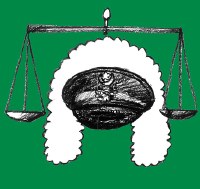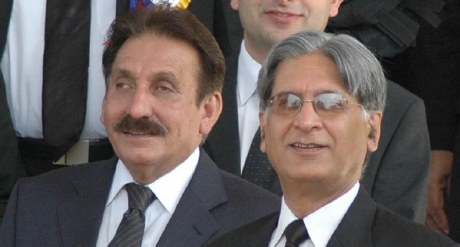Adil Najam
Much has happened in Pakistan over the last many weeks. Too much.
Amidst all the chaos and tragedy it has become difficult to keep track of just all that is happening, let alone make sense of it. It is clear that the dust has not settled yet. Far from it one can be sure that more turmoil and uncertainty is in the offing.
Yet, this we know. Gen. Musharraf sits firm in control; for now. A major national leader has been assassinated; and whether the elections are held or what might happen in them remains shrouded in doubt and speculation. The assault on the nation by extremists and terrorists have intensified. And the economy is taking a spin for the ordinary Pakistan. Despair is thick in the air and neither the military government, nor the political parties, nor the market forces seem to generate broad confidence or enthusiasm.
Adding to the despair is the fact that the two institutions of society that had begun to assert themselves and generate public support and confidence have been clipped violently. The media has been told what its “place” is and what can happen to its profits if it steps out of line. The judiciary has been revamped and the message sent out to newcomers to “learn” from the fate of their predecessors. These are classic authoritarian tactics: Increase the pressure, demonstrate the pain you can inflict, and highlight the fact that you are willing to inflict the pain if needed.
 Whatever one might think of the quality of the media before the clampdown or about the individual quality and character of individual judges is irrelevant to the fact that the descent of blatant authoritarian excess cannot but be bad for the country in both the short- and the long-term. Violence has a tendency to destroy not only those upon whom violence is inflict but also those who inflict violence. The las many weeks have not only weakened the institutions of the judiciary and the press, it has also – and, maybe, more so – damaged (further) the credibility of the military as an institution and of those in government.
Whatever one might think of the quality of the media before the clampdown or about the individual quality and character of individual judges is irrelevant to the fact that the descent of blatant authoritarian excess cannot but be bad for the country in both the short- and the long-term. Violence has a tendency to destroy not only those upon whom violence is inflict but also those who inflict violence. The las many weeks have not only weakened the institutions of the judiciary and the press, it has also – and, maybe, more so – damaged (further) the credibility of the military as an institution and of those in government.
These much more blatant authoritarian tactics have, indeed, allowed Gen. Musharraf to maintain his hold in power. The cost, however, is that to prolong his stay in power he will now find himself compelled to be ever more blatant and obvious in the use of such tactics. Ultimately, and this we know from history in Pakistan and elsewhere, either his ability to apply ever-more stringent pressure or the people’s ability to withstand it will give way and the house of cards will implode.
In the short term, however, one of the impacts of the turmoil and despair that has resulted, especially, from Benazir Bhutto’s assassination is that some news has suddenly gone off our radars. This is not a matter of conspiracy. It is a matter of “despair overload.” But the result is striking. The sentiment for an end of authoritarianism has not extinguished, but the fledgling movement for the restoration for the judiciary and media has been silenced; or, at least, quietened. One has been hearing less and less about Chief Justice Iftikhar Chaudhry or about Chaudhry Aitizaz Ahsan and given the fickleness of public attention and support one fears that the government might be succeeding in its attempts to have them fade away from the public imagination.
The cynics can say that this is because the supporters have themselves become silent, the support rallies have fizzled, the flowers are no longer going to the judges, and that the courts and the media are themselves now functioning again and the emergency has been lifted. All of this is true but none of this is conclusive.
It is quite clear, in fact, that Gen. Musharraf considers these two Chaudhries – Iftikhar and Aitizaz – to be the biggest threat to his power. Here is how:
Even though the exiled leaders Nawaz Sharif and Benazir Bhutto (now assassinated) have been allowed back into the country, even though the emergency has been lifted, even though the media curbs have been lifted, even though Gen. Musharraf has given up his uniform… despite all of this and more, the government is still not confident enough in their own power to release Iftikhar Chaudhry and Aitizaz Ahsan from detention. Everything else the General can manage. But these two Chaudhries are seen as having enough public support and credibility to be seen to be a threat to the General’s rule if allowed out in the open.
This is an extremely telling fact. It demonstrates who the military government thinks they can “manage” and who are considered to be “unmanageable.” The urge felt by the military government to suppress the voice of the two Chaudhries demonstrates how seriously the military government takes these two and the potential support they could muster.
It is interesting to ponder upon why the government would be more threatened by these two than by the mainstream political parties. It is not because these two are super-heroes. They are not. Both are flawed as all of us are. The threat they embody comes from the fact that, unlike the political parties, they have become spearheads (maybe reluctant spearheads) for a nascent movement whose goal is not as much to get a “share of the power” as it is to just see a real “restoration of democracy” and an “end to military rule.” Certainly Iftikhar Chaudhry did not set out to achieve this goal. He was for quite a while quite happy with how things were. Aitizaz Ahsan also did not set out to launch such a movement. But over the last half-year or more, the followers who have gathered around them have thrust this mission on them. It is a mission they now seem to embrace; or at least not shun. It is the nature of this goal that makes accommodation with them much more difficult for the government than with those who, in fact, want to be accommodated. This is exactly why it is important for the government to “control” these two much more than all others.
The unfortunate fact is that on this issue the government’s tactics may be working. Public interest is fickle. Public memory is short. And the overdose of other calamities is strong. Between all of this, the public attention is, and maybe has, been diverted elsewhere. One is reminded of the sheyr:
Reh gaya Mushtaq dil meiN rang-e-yaad-raftagaaN
Phool mehngay ho gaye, qubraiN purani ho gaeeN
Even if one does not agree with or like these two Chaudhries, it would be sad if, in fact, this is the case. The movement they embody is no longer about them. They are quite incidental to it. The movement and the moment that they came to symbolize was a movement and moment for civil society’s desire for democracy. In an environment where every institution of society was collapsing, they seemed to suggest that the democratic spirit – with its most idealistic aspirations – was still alive in Pakistan. The squashing of a judge and a lawyer is bad, but it is not catastrophic in societal terms. However, the squashing of a nation’s democratic spirit is monumental calamity. One fears that what we are seeing here is an attempt to do the latter much more than the former.





















































I long for the day when Pakistani generals and their families will be put under indefinite house arrest like the honorable judges and their families, when their children will be denied the right to go to school, when the water to their houses is cut off, when they are dragged by their hair by policewallas, when they will lose their jobs without rhyme or reason, when the assets which they have stolen from the country they are supposed to defend are rightly taken back. Most importantly I long for the day when Article 6 is applied and these traitors who prance around in frilly uniforms, with batons up their asses are hanged. That will be sweet justice and more importantly, revenge.
Cracks or no cracks – the very fact that Government still feels the need to keep these people under house arrest tells a great deal about the morally pathetic stance of Government of Pakistan.
Anyways, short of ordering the police to shoot at unarmed protesters, this is the best the General (retired and skinned) could come up with. This is the pinnacle of his power, and from here it can go only one way – down.
I felt had PPP nominated Aitzaz to some notable role, either as their PM candidate or their Chairperson even though he had boycotted elections and was demanded an explanation from the late BB, he cud have taken all of us to something new.
When all is falling, i say, lets try out something totally unseen before, let the fauji boots scratch heads on that..
well written article
as they say: power corrupts; absolute power corrupts absolutely!
Go Musharraf Go!
long live the 2 Chaudhries, the champions of Rule of Law!
I agree with you Adil, but no sane person/nation can keep up with the relentless pace of “breaking news” that has been thrust on us. In fact, it will be quite boring, though welcome, when we finally (and hopefully) go back to the days of mundane news in Pakistan.
I don’t think all is lost yet. There was another rally in Isloo on Thursday complete with tear gas and batons.
I think what is more omnious is the cracks that have started to appear within the lwayer ranks. No doubt the “agencies” are at work.